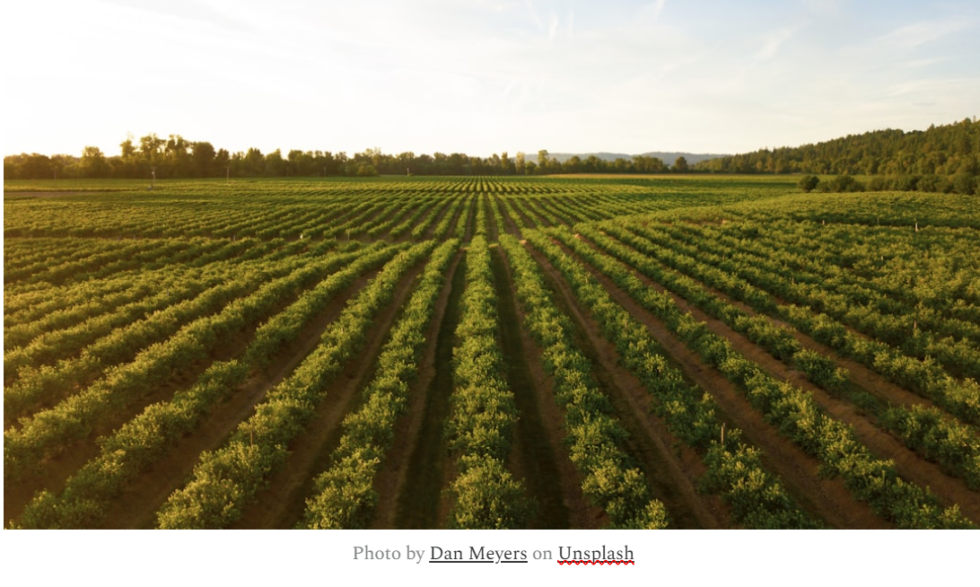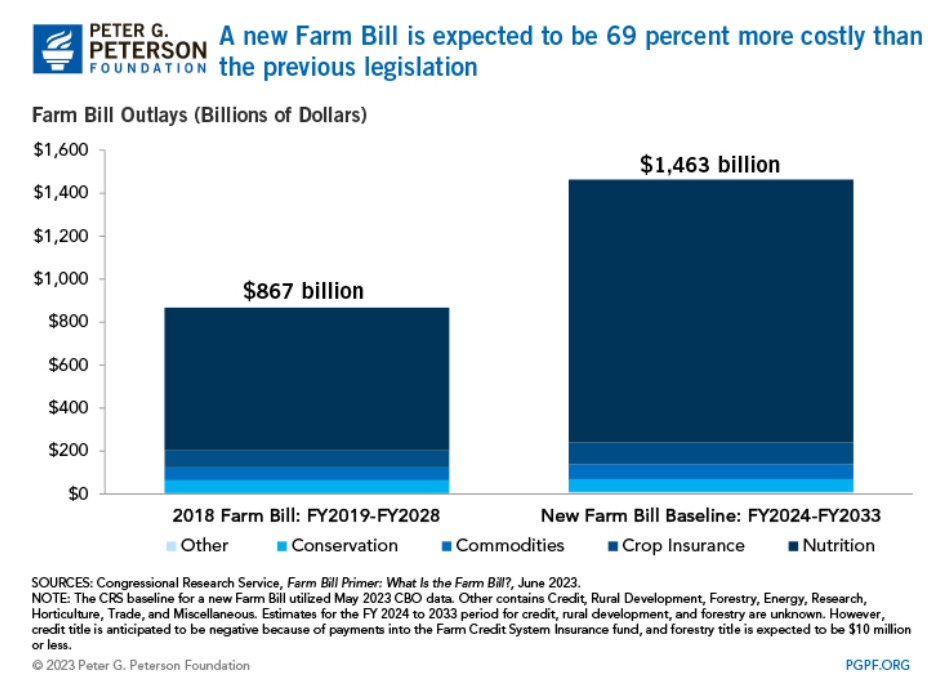
The Farm Bill is stalled in Congress. Its resolution will significantly affect the growing food-insecure population. The question is, will it be for better or worse?
Though the pandemic is shrinking in the American rearview mirror, the number of Americans struggling with food insecurity continues to grow.
Dan Maher is president and CEO of the Fredericksburg Regional Food Bank and is seeing first-hand the growing food insecurity issue in this region.
“Going into the pandemic,” he tells the Advance, “we saw 20,000 to 25,000 people per year.” During COVID, the government significantly ramped up benefits, though it did not slow the stream of people seeking assistance, as the Food Bank saw the number of people they served soar.
“Now we’re seeing 45,000 to 50,000 people per year,” says Maher. “And those numbers are even higher than during the pandemic.”
Maher’s ability to directly address this growing challenge will be directly affected by the Farm Bill that is currently stalled in the U.S. House of Representatives.
Farm Bill Battles
The Farm Bill is one of the largest pieces of legislation that the United States Congress must pass. Last signed in 2018, its 10-year program outlays were projected to be $867 billion over FY2019-FY2028, according to the Congressional Research Service (CRS).
That bill was to be reauthorized in 2023. Despite agreement on many fronts, there are significant disagreements between Democrats and Republicans that stalled the process. A continuing resolution signed last fall has kept the program afloat, but now Congress is pressing against a deadline to get a deal done.
That reauthorization is set to expire again this September, but whether it can get done is in doubt. According to CRS, the bill currently being debated has a 10-year program outlay of $1.4 billion. An increase of about $540 million over the 2018 bill.
More money for the bill isn’t the point of contention in Congress; how that many is spent is the problem.
Democrats want to protect increased benefits for SNAP recipients made in the wake of the 2018 bill.
Republicans want to curb the SNAP funding formula and direct more money toward programs aimed at producers.
Neither plan has an easy way forward.

Funding SNAP
The United States Department of Agriculture was charged in the 2018 Farm Bill with modernizing the Thrifty Food Plan. This plan sets the maximum benefits for SNAP.
Prior to 2021, the Thrifty Food Plan only took into account inflation when setting benefit thresholds. The revised plan under President Biden also took into account other factors like current dietary guidelines, food consumption data, and the cost of food items at retailers.
This led to a significant increase in purchasing power of SNAP benefits. According to a report from Feeding America, this increase helped keep 2.3 million people above the poverty line, and it decreased child poverty by 8.6%
Nonetheless, SNAP benefits still have not keep pace with food prices.
According to Feeding America, in 78% of U.S. counties SNAP benefits do not cover the full local coast of a meal. Further, more than half of SNAP recipients use all their monthly benefits in just two weeks. And that has many who serve vulnerable populations nervous.
Despite rising funds for SNAP, escalating inflation in other segments is growing food insecurity.
“Hunger is the symptom,” Maher says. “It’s housing costs and child care and health care that are pushing people into hunger.”
Feeding America’s interactive Map the Meal Gap tool shows how even with additional benefits, Virginians are struggling more than ever to be food secure.
In Virginia, an average meal costs $4.06. According to data in the Map the Meal Gap tool, it would take another $736,000,000 to meet food needs in the commonwealth. (For a closer look at Virginia’s county-level meal gap, click here.)
Subsidizing Farmers
Across the aisle, concerns are being raised about the impact of inflation on those who produce food.
Chairman Glenn ‘GT’ Thompson (PA-15) is chairman of the House Committee on Agriculture and is looking to increase funds for producers through raising both the Agriculture Risk Coverage (ARC) and Price Loss Coverage (PLC) programs.
These programs “provide financial protections to farmers from substantial drops in crop prices or revenues and are vital economic safety nets for most American farms,” according to the United States Department of Agriculture.
Thompson’s plan, according to the Washington Post, would provide “billions of dollars [for] raising the price floors for agricultural commodities by as much as 20 percent. Soybeans, which in April traded at $11.80 a bushel, according to the Agriculture Department, would have a guaranteed price of $10 under the legislation, up from $8.40. Wheat in April traded at $5.91 a bushel and would have a $6.35 price floor, up from $5.50.”
The funds to pay from this would come from the modernized funding schedule for SNAP.
Bridging the gap between protecting the gains made in SNAP benefits, while shoring up farmers who produce food is the key to getting a Farm Bill passed.
Will It Happen?
Abigail Spanberger (VA-07) remains confident that a Farm Bill deal can get done.
“The U.S. House and U.S. Senate Agriculture Committees are continuing to work to negotiate and pass a Farm Bill,” she told the Advance. She points to a proposal put forward by Chair Debbie Stabenow (D-MI) as a possible way forward.
“I remain confident,” Spanberger tells the Advance, “that we can pass a Farm Bill that supports the community organizations that work to keep our neighbors fed, like the Fredericksburg Regional Food Bank, and the Virginians these organizations serve.”
The problem, according to Punchbowl News, is getting a bill on the House side to the floor.
The Republican plan has been criticized by both the left-leaning EWG and the right-leaning Heritage Foundation. With a narrow majority in the House, a party-line vote won’t get this bill across the finish line.
Local Impact
Often lost in the discussions over the hundreds of millions of dollars in omnibus bills like the Farm Bill are it affects the ultimate decisions have on those whose boots are on the ground and have to deal with the fallout, wherever it comes.
“We recognize the challenges that government officials must face,” Maher tells the Advance. “Our strongest advocacy and concern are our neighbors who are interacting with our network. In that dimension, we’re going to prioritize how SNAP benefits will help these people.”
The food bank is directly involved in SNAP registration, and Diane Grimes, who registers people for the federal program, is seeing the increasing need in our community.
“SNAP registrations are going up, she told the Advance in late June. “My goal was 30 sign-ups a month. I’m at 49 already this month and have appointments booked.”
Echoing Maher’s observation that hunger is the “symptom” of the deeper economic pain people are feeling around housing, health care, and home pricing, Grimes reports that many of the “people who come in to fill out a SNAP application … have other insecurities as well.”
“The greater undermining of our national fabric and community health,” Maher says, “is if individuals don’t have access to the food that they need.”
If you are experiencing food insecurity, or know someone who may facing this problem, you can reach out to Debbie Grimes at the Fredericksburg Food Bank to see if you qualify for SNAP benefits. Call: 540-371-7666 x146, or email Grimes directly.
Follow us on Facebook | Instagram | Youtube

Local Obituaries
To view local obituaries or to send a note to family and loved ones, please visit our website at the link that follows.

Support Award-winning, Locally Focused Journalism

The FXBG Advance cuts through the talking points to deliver both incisive and informative news about the issues, people, and organizations that daily affect your life. And we do it in a multi-partisan format that has no equal in this region. Over the past month, our reporting was:
$8 a month supports great journalism
- First to report on a Spotsylvania School teacher arrested for bringing drugs onto campus.
- First to report on new facility fees leveled by MWHC on patient bills.
- First to detail controversial traffic numbers submitted by Stafford staff on the Buc-ee’s project
- Provided extensive coverage of the cellphone bans that are sweeping local school districts.
- And so much more, like Clay Jones, Drew Gallagher, Hank Silverberg, and more.
For just $8 a month, you can help support top-flight journalism that puts people over policies.
Your contributions 100% support our journalists.
Help us as we continue to grow!





